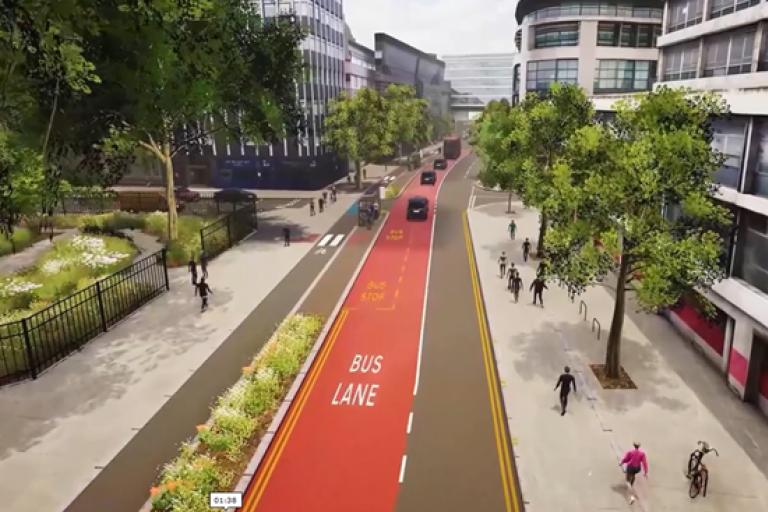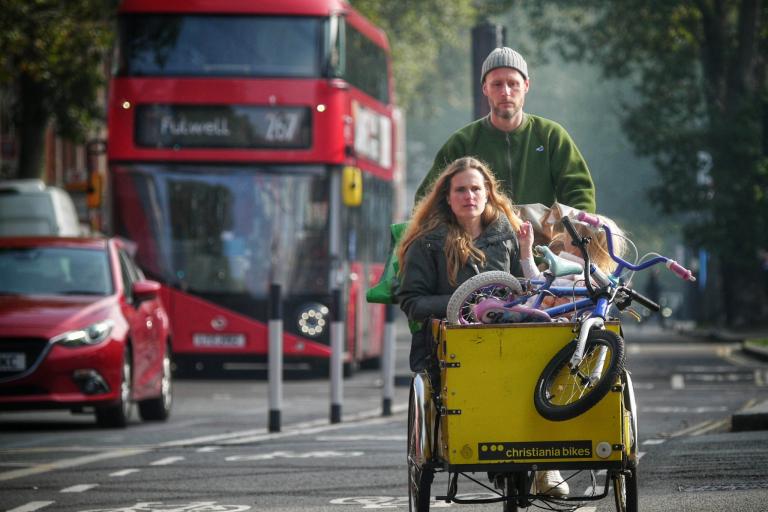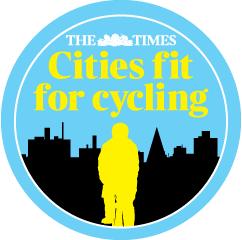- News
- Reviews
- Bikes
- Accessories
- Accessories - misc
- Computer mounts
- Bags
- Bar ends
- Bike bags & cases
- Bottle cages
- Bottles
- Cameras
- Car racks
- Child seats
- Computers
- Glasses
- GPS units
- Helmets
- Lights - front
- Lights - rear
- Lights - sets
- Locks
- Mirrors
- Mudguards
- Racks
- Pumps & CO2 inflators
- Puncture kits
- Reflectives
- Smart watches
- Stands and racks
- Trailers
- Clothing
- Components
- Bar tape & grips
- Bottom brackets
- Brake & gear cables
- Brake & STI levers
- Brake pads & spares
- Brakes
- Cassettes & freewheels
- Chains
- Chainsets & chainrings
- Derailleurs - front
- Derailleurs - rear
- Forks
- Gear levers & shifters
- Groupsets
- Handlebars & extensions
- Headsets
- Hubs
- Inner tubes
- Pedals
- Quick releases & skewers
- Saddles
- Seatposts
- Stems
- Wheels
- Tyres
- Health, fitness and nutrition
- Tools and workshop
- Miscellaneous
- Tubeless valves
- Buyers Guides
- Features
- Forum
- Recommends
- Podcast
news
The Times publishes ‘Two Wheels Good’ editorial – nine months after calling for dangerous cycling law; Oxford residents act as “human bollards” to protect LTNs; Liz Truss and cycling; Ireland’s Tour de France bid; Vine in Lycra + more on the live blog
SUMMARY
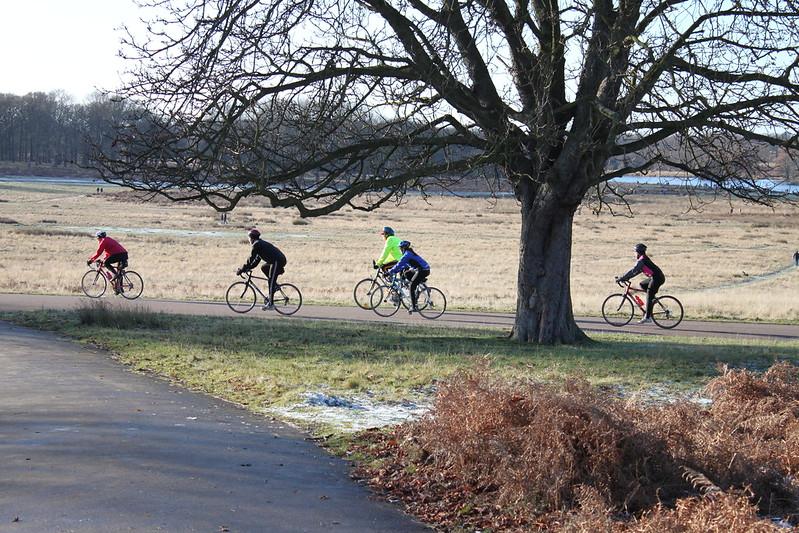 Richmond Park road cyclists in winter - via Flickr Creative Commons
Richmond Park road cyclists in winter - via Flickr Creative Commons20 October 2022, 15:58

Reader reaction: The Times, the Tour, and the need for a new article on how Liz Truss resigning will impact active travel
The Times’ apparent U-turn on cycling this morning (it feels like a lifetime ago now, doesn’t it?) led to some discussion in the comments about how cycling is perceived by and presented in the media.
According to IanMSpencer, The Times’ most recent editorial view that riding bikes is becoming mainstream is “being London-centric”.
He continued: “I'd be hard pressed to identify any major shifts in cycling around the Midlands of the same scale we have seen in London. Counter-cultural – never. Increasingly marginalised by the mainstream media, definitely.
“But at least they are contemplating that cycling might not be the domain (Domane?) of the criminal and feckless.”
On the newspaper’s abrupt shift in tone, hawkinspeter wrote: “I don't mind people/organisations changing their opinions based on better knowledge etc., but I think they should have at least acknowledged that they're doing a U-turn, otherwise it comes across as just shouting random opinions with no consistent train of thought.
“I'd disagree that cycling was counter-cultural 20 years ago – that's just the narrative that motor interests have pushed.”
“Oh, I wish that cycling really was mainstream but in ain't,” says brooksby. “And the Murdoch papers – and others – still push the view that cycling is somehow "countercultural", IMO...”
Away from The Times and onto the Tour, where Secret_squirrel has some novel ideas for how cycling’s biggest race can commit to a green agenda while maintaining its money-spinning foreign starts:
Why can’t they do a stage in Ireland, ferry across to Wales, then lay some boards down in the Chunnel just like Zwift have done on the London Underground?
Alternatively defer for 20 years until Boris’ Bridge is built. Imagine the literal fireworks as the peloton crosses the Beaufort’s Dyke munitions dump.
Finally, AlsoSomniloquism summed up what were all thinking when Liz Truss stood outside No. 10 this lunchtime:
So, another article on what a new PM will mean for Cycling and Active Travel needed?
20 October 2022, 15:47
20 October 2022, 15:30

State-of-the-art wind tunnel opens in Manchester
Here’s a not-quite-so-controversial story about British Cycling, for a change…
A new state-of-the-art wind tunnel, designed to support the efforts of Great Britain’s elite cyclists as they prepare for the 2024 Olympics as well as riders of all levels, was officially unveiled in Manchester this afternoon by Olympic champions Chris Boardman and Ed Clancy (sporting his Shell-branded Team GB kit as he tried out the new equipment).
Originally conceived by Boardman and based at the Boardman Performance Centre in Evesham, the tunnel has been rebuilt and upgraded with the support of UK Sport and Manchester City Council, while the tunnel fan and control units were relocated to Manchester thanks to Halfords generously donating them for just £1.
It uses finely tuned data capture system which feeds video imagery and information back to the rider in real-time, while aerodynamicists can constantly shift wind speed and direction to mimic the conditions of any event or environment.
Credit: British Cycling
The facility will be based at the Manchester Institute of Health and Performance on the Etihad Campus in East Manchester, near the National Cycling Centre, and opens as Team GB’s track riders head back to Manchester after spending most of 2022 training in Derby.
“Having a state-of-the-art wind tunnel in Manchester, the home of British Cycling, means that we are able to deliver our primary focus of supporting talented riders to achieve their best and continue to deliver world-leading performances, such as those we saw at last week’s UCI Track Cycling World Championships,” says GB’s performance director Stephen Park.
“It’s always great working with our Etihad Campus neighbours at the Manchester Institute of Health and Performance, which brings together leaders from elite sports, grassroots community sports, and world-class healthcare to deliver cutting-edge care and facilities for everyone, from elite athletes to the local community. Being able to house the wind tunnel at this facility offers huge benefits to our riders and programme as a whole.
“Thanks to Halfords, we will be able to continue to develop our understanding of bicycle aerodynamics, the related performance impact, and therefore provide an even better service to riders who represent this country with pride. It is a fantastic addition to the elite training facilities available to British riders while providing even better value for the investment we receive from the National Lottery via UK Sport.”
Team GB will certainly be hoping that this latest investment aids their efforts to become a well-oiled machine by Paris 2024…
20 October 2022, 14:59
Just one more, I promise!
Alaphilippe did a frontflip on gravel, got wiped out by his own teamcar, got hospitalized after his LBL crash and crashed out of the Vuelta and STILL had the same amount of racedays as Liz Truss served days as PM.
— #FreeNairo (@NairoInGreen) October 20, 2022
20 October 2022, 14:36
More ‘fun’ Liz Truss and cycling trivia
Question: What do Eddy Merckx, Bernard Hinault, Lance Armstrong, Miguel Induráin, Chris Froome and Jacques Anquetil all have in common?
(Scroll past the rather sultry portrait of the Badger for the answer…)
Now, that's a PM-worthy look...
Answer: They have all, of course, spent more days in the yellow jersey at the Tour de France than Liz Truss managed as Prime Minister…
Rather astonishingly, Eddy Merckx’s time in the lead of the world’s biggest bike race (96 days) is more than double Truss’s stint in No. 10 (45 days).
Bonus fact: In each of the 1970, 1971, 1972 and 1973 seasons, Merckx’s number of professional road race victories in a single calendar year (52, 54, 50 and 51 respectively) was higher than the number of days the former PM ticked off in the top job.
And the Cannibal fell just short of Truss’s tally (if we can call it that) in 1969, when he won 43 pro races.
And who said we couldn’t link the current chaos within the Tory party to cycling?
20 October 2022, 13:44
No B&B Hotels – or Drone Hopper-Androni – on UCI team list for 2023
51 men's and women's professional road cycling teams have submitted essential documents with a view to registration in 2023 - https://t.co/6ta0OkTDOA pic.twitter.com/B392HgYkWc
— UCI_media (@UCI_media) October 19, 2022
The UCI’s publication last night of a list of 51 men’s and women’s professional teams that have applied for licences from the sport’s governing body caused some online murmuring last night as B&B Hotels – the team reportedly undergoing a major overhaul with Mark Cavendish touted as a star signing – conspicuous by their absence.
While the French team, managed by former pro Jérôme Pineau and rumoured to be receiving investment for 2023 from the City of Paris and Amazon France, have remained tight lipped about their rebranding and restructuring plans, they did respond to their absence from the UCI’s list, claiming it was all done to legal issues stemming from the squad’s soon-to-be-announced “evolution”.
> Mark Cavendish's new team... (maybe)
“The B&B Hotels – KTM team takes note of this absence from the provisional list of candidate teams for the UCI ProTeam category for next season, published today by the UCI,” the team wrote on Twitter yesterday evening.
“This delay is due to the change of legal structure inherent to the evolution of the for the coming years.
“Aware of the upcoming deadlines set by the UCI for its registration in the ProTeam category, the team is doing its utmost to provide the missing documents as soon as possible.”
The UCI confirmed in their document that any teams which failed to submit the necessary documents still have until the end of the registration procedure to ensure they are ready and able to race next year – so don’t go writing off Cavendish’s 35th Tour de France stage win just yet.
Another name missing from the list may have slightly more reason to fret.
Drone Hopper–Androni Giocattoli – the Italian squad managed by everyone’s favourite enigmatic Swiss Tony impersonator, Gianni Savio, and responsible for the emergence of the likes of Egan Bernal and Iván Sosa on the European scene – are rumoured to be on the brink of shutting up shop.
According to reports, Savio has been scrambling to find a sponsor (not for the first time I may add), just under a year after unveiling Spanish aeronautical engineering company Drone Hopper on the team’s crowded jersey.
“They came in with big ideas,” the veteran DS told Cyclingnews last week. “We said: ‘Careful, let’s move gradually’.
“They’re good people at Drone Hopper but, unfortunately, it’s a start-up company. They would like to continue sponsoring us, but they don’t have the means at the moment. They tell me they’re starting to earn money and that they will be able to pay us, but I said I need a guarantee.
“We have a bank guarantee of €350,000, but that doesn’t bring you far with a team at this level and I certainly don’t want to tie myself to that risk.
“That’s the situation we’re in – we’re in a situation of standby. It’s not true that we’ve decided not to continue, but it’s also not certain that we will continue.
“Given that Drone Hopper is in difficulty, we have to find an alternative solution – that is, a replacement sponsor. Otherwise, we won’t continue because it’s continuous stress. You can’t keep the squad going properly with all these economic issues to worry about.”
It all sounds a bit grim, with Savio, who blames the expansion of the WorldTour for the squeeze on smaller squads, conceding that briefly dropping down into the third tier may be required to save his team beyond 2023.
But if anyone in cycling can conjure something from nothing, it’s Gianni Savio.
20 October 2022, 13:35
20 October 2022, 12:58

Liz Truss resigns as Prime Minister: Cycling special
To mark the end of the latest chapter in the sorry tale that is British politics in 2022, here’s a quick roundup of tweets tenuously – but brilliantly – linking the resignation of noted Brompton enthusiast Liz Truss as Prime Minister to all things cycling:
Dan Bigham’s Hour Record lasted for 6 days more than Liz Truss’s premiership.
— Daniel Friebe (@friebos) October 20, 2022
Our team has more sponsors (47) than days Liz Truss spent in office (45) pic.twitter.com/q1WKzBih4F
— Intermarché-Wanty-Gobert (@IntermarcheWG) October 20, 2022
Chris Froome spent 15 more days in the yellow jersey than Liz Truss managed in Number 10.
— tom owen (@tomowencc) October 20, 2022
Take out period of national mourning and party conference and it might be closer to a Dauphine
— Joe Earley (@joeearley) October 20, 2022
The Nairo Quintana Tramadol case has outlived Liz Truss tenure as PM
— #FreeNairo (@NairoInGreen) October 20, 2022
20 October 2022, 12:19
Oxford residents act as “human bollards” to protect Low Traffic Neighbourhood
Following months of vandalism targeting Low Traffic Neighbourhoods in Oxford – where bollards preventing motorists from accessing the scheme have been rammed out of the way and even set on fire and melted into the road – local residents have joined forces to act as “human bollards” at the entrance to LTNs.
WATCH: ordinary residents in #Oxford are now acting as 'human bollards' to protect cyclists, pedestrians and children from drivers who flout the rules, and vandals who have destroyed the physical bollards. Extraordinary, really. pic.twitter.com/UEEdWYRw1l
— Oxfordshire Liveable Streets (@OxLivSts) October 19, 2022
In a video posted online yesterday by Oxfordshire Liveable Streets, a pro-LTN and active travel group, a group of residents stood in the entrance to one of the schemes – where a bollard had been removed – to “protect cyclists, pedestrians and children from drivers who flout the rules, and vandals who have destroyed the physical bollards.”
According to the Oxford Mail, police were called to Divinity Road in the city (where the demonstration captured in the above video appears to have taken place) at around 5pm yesterday evening after a motorist attempted to drive through the LTN before being stopped by residents.
Officers attended the scene and reportedly educated the driver.
> Council stands firm against vandals and votes to keep low-traffic neighbourhoods
In July, Oxfordshire County Council voted to make LTNs in the city permanent after a petition attracting almost 6,000 signatures called for the traffic-calming scheme, in place in various parts of Oxford since March 2021, to be scrapped.
The council heard a wide range of views from the public before councillors voted to keep the scheme, with improvements — including considering ANPR cameras — to be made by spring 2023.
20 October 2022, 11:48
“Rather than leaving the sport embittered and disenfranchised, we leave it proud and on our terms”: Ribble Weldtite issue statement on team’s demise
A few words from us following this weeks news. pic.twitter.com/5ey1KrJbWG
— Ribble Weldtite Pro Cycling (@RibbleWeldtite) October 20, 2022
> British Conti team Ribble Weldtite set to fold following sponsorship issues
20 October 2022, 11:21

“Nothing happened the last time they came, right?” Reaction to Ireland’s Tour de France bid
I think it’s fair to say that on road.cc in recent weeks we’ve been fairly critical of grand tour organisers who – in the face of the current climate crisis – insist on incorporating mammoth transfers as part of their routes, as well as featuring an increasing number of far-flung, and lucrative, foreign starts.
For example, on Tuesday we reported on the blog that Giro d’Italia organisers RCS Sport received quite a bit of flak for moving the finale of next year’s race to Rome, necessitating a 750km transfer from the penultimate stage in the far north-east of Italy, for a few ceremonial laps of the capital.
> “Totally unnecessary”: 2023 Giro d’Italia route – and that 750km transfer to Rome – confirmed
Of course, the Giro isn’t the only grand tour guilty of ignoring the pleas of environmental activists: each of the big three-week races began outside of their respective home countries in 2022, to the extent that all three events required early ‘travel days’ to facilitate the long journey back home following a money-spinning opening weekend.
Ireland bids for cross-border Tour de France Grand Départ
Dublin hosted start of race in 1998, and together with Belfast welcomed opening stages of 2014 Giro d’Italiahttps://t.co/3ogQbbh4Ha #cycling pic.twitter.com/L0p0y0dBqq
— road.cc (@roadcc) October 19, 2022
Then the news broke last night that the Irish government and Northern Ireland executive have submitted an expression of interest to host the Grand Départ of the Tour de France, with 2026 and 2027 pencilled in as possible dates for the proposed festival of yellow and green (though not quite so much of the environmental variety, I suspect).
It’s not yet clear if the Tour – if it does make it to Ireland in the next few years – will kick off in Dublin (the scene of the Grand Départ of the scandal-ravaged 1998 ‘Tour de Festina’, and over 1,000km from Paris) or Belfast (where the 2014 Giro set off from, a 1,250km drive to the French capital), but the opening stages will likely incorporate an all-island, cross-border theme.
> Ireland bids for cross-border Tour de France Grand Départ
And I’m buzzing.
Yes, I know what you’re saying: ‘How can you criticise the environmental impact of foreign Grand Départs, and then dance around the room singing because the biggest bike race in the world might start 20 minutes from your house?’
Because I’m a hypocrite, that’s why.
And it turns out there are many like me:
It's been a long time coming!
— Colin O'Carroll (@colinocarroll) October 19, 2022
The Giro d'Italia was an unqualified success for the entire island and brought world attention not just to Irish cycling, but to tourism, business and appreciation of everything positive about this place. Le Tour would be a win for all. Ireland can do it in a heartbeat.
— Colin O'Carroll (@colinocarroll) October 19, 2022
2027 with a 40th anniversary celebration of Roche's win would be awesome
— Stu 🏴 🇪🇺 (@tsaritsyn) October 19, 2022
Wow. Go Ireland
Won't be as good as Yorkshire obvs😉 https://t.co/6oZZnhFtjK— Real Gaz on a proper bike (@gazza_d) October 19, 2022
Such great news! And hardly a coincidence that I was in a cycling documentary and the very next week the Tour de France wants to come to Ireland. 💪🏼 https://t.co/nmyiw2fQzi
— Cillian Kelly (@irishpeloton) October 19, 2022
However, not everyone is as enthused by the prospect of a second Tour start in Ireland, with the some of the more negative online responses ranging from concerns about the race's environmental impact and prioritising funding for the domestic racing scene, to the belief that professional cycling is still partying like it’s 1998:
Given the lengthy transfers this bid would entail, I’m sure many would be keen to hear you set out your approach to addressing the growing concerns over World Tour cycling’s carbon footprint.
— Jeremy Whittle (@jeremycwhittle) October 19, 2022
As a 50 year long cycling fan it's great to see but would also love to see serious consideration from the department into funding for our own ras tailteann which has highlighted our beautiful country for 70 years.
We need to make it sustainable going forward— Ger Campbell (@gerardcam) October 19, 2022
I would prefer to see investment in an annual week-long Tour of Ireland.https://t.co/GPKIlmkUDY
— Graham Healy (@Healycycles) October 19, 2022
Jack Chambers @fiannafailparty on @morningireland talking about Ireland bidding for stages on the Tour De France. How about just housing our homeless Jack?? That’s a priority! Not a nonsense flag waving exercise! #HowIrelandWorks
— Gemma Kennedy (@gemmaration) October 20, 2022
Mortgage rules relaxed. Tour de France coming back to Ireland. Celtic Tiger’s back, baby!
— Paul Howard (@AkaPaulHoward) October 19, 2022
Very excited about the Tour de France coming back to Ireland. Nothing happened the last time they came, right?
— Ger Gilroy (@gergilroy) October 19, 2022
My ‘favourite’ reaction, however, has to be from NewstalkFM’s host Shane, who adopted (in my opinion) a rather overblown and moralistic approach to cycling’s doping problems:
‘We hosted the Tour de France in 1998 and it unravelled horribly.’ Shane and Ciara discuss the news that Ireland has agreed to bid to host the Tour de France @NTBreakfast pic.twitter.com/B3QY1t6VP5
— NewstalkFM (@NewstalkFM) October 20, 2022
Eh, was he not paying attention to the politicians in charge of running the country back in the late 1990s?
Anyway, onto the most important aspect of all this: Will I be able to break my record – accomplished during the 2014 Giro start in Belfast – of watching the race eight times in eight different locations during the opening weekend?
20 October 2022, 09:59
Spot the difference
This is the last Bianchi Oltre-related blog post, I promise…
these two bikes are the same change my mind pic.twitter.com/fDFEby6lam
— mitja (@mitjamandic) October 19, 2022
20 October 2022, 09:34
Breaking News: Jeremy Vine converts to Lycra
After years spent resisting Lycra — because petrosexuals routinely sound off about “Lycra louts” etc — I've succumbed. It's cooler and less sweaty and makes a bike commute easier. People who are angry about Lycra: go away and do one.
Meanwhile these were my legs this afternoon. pic.twitter.com/zAImnK6cOT— Jeremy Vine (@theJeremyVine) October 19, 2022
20 October 2022, 09:10
Cargo bike riders ‘annoy drivers’, says The Times… But remember, ‘two wheels good’
It turns out that that you don’t have to go all the way back to January to find a Times take on cycling which contrasts with the rather sunny disposition of the newspaper’s latest ‘Two Wheels Good’ editorial.
This article from… checks notes… four days ago – while ostensibly in favour of cycling and using cargo bikes – managed to feature this rather unfortunate strapline about cyclists annoying motorists:
It is wonderful to see parents discovering cargo bikes as a fun, green and easy way to do the school run.
But the “parent annoying drivers on city streets” is a very strange take.
More parents taking their kids by bike means less car traffic, freeing up road space for everyone. pic.twitter.com/oAjBmEebXu
— Adam Tranter (@adamtranter) October 16, 2022
20 October 2022, 08:42
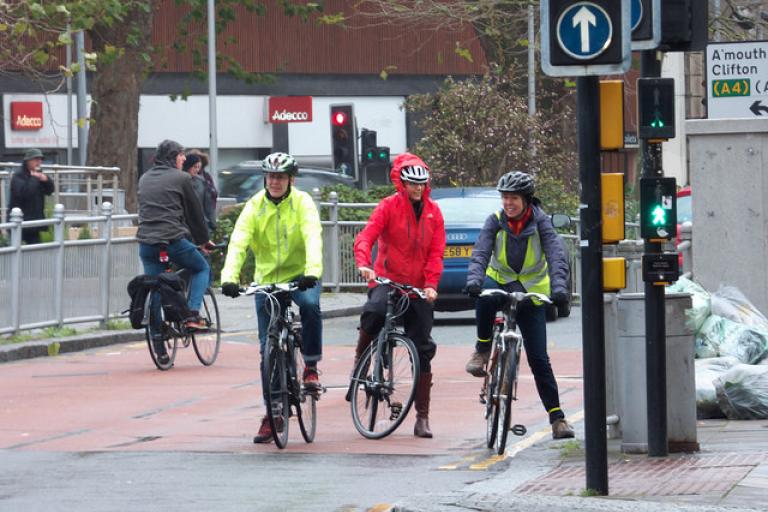
The Times publishes ‘Two Wheels Good’ editorial – nine months after calling for dangerous cycling law and riders to be licensed and insured
U-turns appear to be in fashion at the moment.
Last night, while everyone was glued to the latest shenanigans in the lobbies of Westminster, The Times performed its own shocking about-turn by publishing an article on the “increase in cycling” entitled “Two Wheels Good”.
In the editorial, the newspaper described the “boost to cycling from quiet streets” as “among the few beneficial side-effects of the coronavirus crisis”, before arguing that “the rising cost of living in general, and expensive fuel in particular, are having a similar impact”.
The article continues: “Twenty years ago cycling was considered countercultural. Ten years ago it was still viewed as an eccentric activity.
“Now, though, pedal power has re-entered the mainstream of national life, used by millions as a cheap, healthy, reliable and green mode of transport, rather than embraced as a way of life by a minority.
“Today, most cyclists are also motorists and many motorists are also cyclists. Contrary to received wisdom, almost all cyclists, just like motorists, obey the Highway Code. Those that don’t, should.”
While it’s hard to argue with those sentiments, for those paying attention to The Times’ recent stance on cycling, the tone of yesterday’s editorial somewhat jars with a lead article, on the same subject, published by the same newspaper just under nine months ago.
In late January, on the eve of the introduction of changes to the Highway Code, The Times called for cyclists to be licensed and insured and for a new offence of causing death by dangerous cycling to be introduced.
That editorial – entitled ‘The Times view on dangerous cycling: Safety Standards’ – argued that a dangerous cycling law “would not penalise cyclists but merely correct an anomaly whereby those who recklessly cause death on two wheels are treated differently from those who do so on four”, while it would “further enhance safety and equity if cyclists were required to hold licences and take out liability insurance, just as motorists are.”
Finally, the article suggested that cyclists should pay to use the road and claimed that the “objection that it would deter legitimate cycling is not persuasive. The road network is a service available to everyone, and it is reasonable to expect those who benefit from it to abide by its regulation and contribute to its upkeep.”
Worlds apart then, you might argue, from yesterday’s editorial lauding the rise of cycling as a low-cost alternative to driving.
> ‘Save Our Cyclists’ – The Times launches major cycle safety campaign
Of course, that January article also represented another significant volte-face from The Times’ previous campaign to ‘Save Our Cyclists’.
Launched on 2 February 2012 – and accompanied by a front-page picture of Mary Bowers, the Times journalist left with life-changing injuries when a lorry driver struck her outside the newspaper’s then-headquarters in Wapping – the ‘Cities Fit For Cycling’ campaign set out an eight-point manifesto calling, among other things, for safety improvements concerning lorries and at junctions, the building of “world class” active travel infrastructure, and for cities to appoint a cycling commissioner.
The campaign sparked a House of Commons debate later that month, with the then-All Party Parliamentary Cycling Group holding a six-week inquiry the following year which culminated in the publication of the Get Britain Cycling report.
Ten years on, The Times’ latest lead article on cycling has praised the work of their award-winning campaign, which it says was instrumental in pushing the cause of cycling safety “up the transport agenda”.
“Increasingly, cars and bikes share the highways safely and amicably. In 2004 134 cyclists were killed on Britain’s roads in the course of 2.56 billion miles cycled. In 2020 fatalities numbered 141 yet the mileage had doubled,” the article notes.
“It is more than a decade since The Times launched our Cities Fit for Cycling campaign and, in pushing the cause up the transport agenda, the effort has been a success.
“No politician, planner or indeed HGV driver can claim to be ignorant of the needs of the growing cycling lobby, unwittingly expanded and empowered as it has been by a virus and a war.
“Sometimes good things happen for bad reasons.”
Absolutely. But we’ll just not mention bad articles published in January…
After obtaining a PhD, lecturing, and hosting a history podcast at Queen’s University Belfast, Ryan joined road.cc in December 2021 and since then has kept the site’s readers and listeners informed and enthralled (well at least occasionally) on news, the live blog, and the road.cc Podcast. After boarding a wrong bus at the world championships and ruining a good pair of jeans at the cyclocross, he now serves as road.cc’s senior news writer. Before his foray into cycling journalism, he wallowed in the equally pitiless world of academia, where he wrote a book about Victorian politics and droned on about cycling and bikes to classes of bored students (while taking every chance he could get to talk about cycling in print or on the radio). He can be found riding his bike very slowly around the narrow, scenic country lanes of Co. Down.
Add new comment
21 comments

brooksby
|
2 years ago
1 like
Newsthump headlines:
Prime minister elected by 0.1% of the electorate to be replaced by one elected by 0%
https://newsthump.com/2022/10/20/prime-minister-elected-by-0-1-of-the-el...
New Worst Prime Minister in History set to be in place by next week
https://newsthump.com/2022/10/20/new-worst-prime-minister-in-history-set...





Secret_squirrel
|
2 years ago
2 likes
I'd like to see a bit more commitment to greeness from Le Tour.
Why cant they do a stage in Ireland, Ferry across to Wales, then lay some boards down in the Chunnel just like Zwift have done on the London Underground?
Alternatively defer for 20 years until Boris' Bridge is built. Imagine the literal fireworks as the peloton crosses the Beauforts Dyke munitions dump.


PRSboy
|
2 years ago
3 likes
Re spot the difference of the Bianchi and the Cervelo.
Well, apart from the top tube, the seatstays, the seat tube, seatpost and stem being completely different, I agree the two bikes are dead ringers.
I recommend Mitja goes to the opticians rather than wasting time tweeting.


IanMSpencer
|
2 years ago
3 likes
I'd suggest though that the Times is being London-centric. I'd be hard pressed to identify any major shifts in cycling around the Midlands of the same scale we have seen in London. Counter-cultural - never. Increasingly marginalised by the mainstream media, definitely.
But at least they are contemplating that cycling might not be the domain (Domane?) of the criminal and feckless.
I'd suggest though that the Times is being London-centric. I'd be hard pressed to identify any major shifts in cycling around the Midlands of the same scale we have seen in London. Counter-cultural - never. Increasingly marginalised by the mainstream media, definitely.
But at least they are contemplating that cycling might not be the domain (Domane?) of the criminal and feckless.
It feels like more cycling in Reading and not just couriers... plenty more women and cargo bikes. I have no data for that, and we probably class as greater London


hawkinspeter
|
2 years ago
9 likes
Here's the Times article without the paywall: https://archive.ph/wTOOg
I don't mind people/organisations changing their opinions based on better knowledge etc. but I think they should have at least acknowledged that they're doing a U-turn, otherwise it comes across as just shouting random opinions with no consistent train of thought. I'd disagree that cycling was counter-cultrural 20 years ago - that's just the narrative that motor interests have pushed.

Twenty years ago cycling was considered countercultural. Ten years ago it was still viewed as an eccentric activity. Now, though, pedal power has re-entered the mainstream of national life, used by millions as a cheap, healthy, reliable and green mode of transport, rather than embraced as a way of life by a minority.
Oh, I wish that cycling really was mainstream but in ain't.
And the Murdoch papers - and others - still push the view that cycling is somehow "countercultural", IMO... ![]()

But isn't that the modus operandi of the right wing media to shout random opinions to generate clicks ?
I have no doubt who wrote this in the Times has now been taken into a darkened room to be re-programmed ?
But I live in hope that change maybe happening - fingers crossed !

Latest Comments
- ChrisA 2 sec ago
You want solar panels? Yours for €1659. https://widepathcamper.com/spare-part/428629/solar-cell-kit-complete-wit...
- Simon E 20 min 58 sec ago
perhaps write something yourself while you're here, whinger.
- Beachboy 38 min 14 sec ago
If you want to see a real demonstration, albeit on social media from kick ball fans, tell them you are keeping the trees but making the road a...
- ErnieC 1 hour 15 min ago
So sweep it under the rug and play the genocide card against smaller nations? Should not be difficult for UCI to ban IPT, UAE, Bahrain victorious...
- CyclingGardener 1 hour 27 min ago
My very first LED front light - a present, so possibly expensive - proudly stated that it was visible half a mile away or something, then in the...
- hawkinspeter 2 hours 3 min ago
Thanks, but I'll give Xitter a miss. I never used Twitter back in the day (well apart from an account for automated alerts on servers), but I...
- ErnieC 2 hours 6 min ago
We should also be asking if XDS-Astana should be allowed to compete based on the persecution and genocide of the Uyghur people and other Muslim...
- HLaB 3 hours 10 min ago
You say they are only compatible with round bars, perhaps that should be fully compatible. I've been running the older set on my flat TT bars since...
- mdavidford 4 hours 43 min ago
The template at the top of that Wikipedia entry works on so many levels:
